Book contents
- Frontmatter
- Contents
- Notes on contributors
- Acknowledgements
- Introduction: an intellectual rebel with a cause
- Part I Civil society, coercion and liberty
- Part II Ideology, nationalism and modernity
- 5 Nationalism: restructuring Gellner's theory
- 6 Between the book and the new sword: Gellner, violence and ideology
- 7 Ernest Gellner and the multicultural mess
- Part III Islam, postmodernism and Gellner's metaphysic
- Index
- References
6 - Between the book and the new sword: Gellner, violence and ideology
Published online by Cambridge University Press: 22 September 2009
- Frontmatter
- Contents
- Notes on contributors
- Acknowledgements
- Introduction: an intellectual rebel with a cause
- Part I Civil society, coercion and liberty
- Part II Ideology, nationalism and modernity
- 5 Nationalism: restructuring Gellner's theory
- 6 Between the book and the new sword: Gellner, violence and ideology
- 7 Ernest Gellner and the multicultural mess
- Part III Islam, postmodernism and Gellner's metaphysic
- Index
- References
Summary
Introduction
We live in an age which abhors violence. Grounded in the spirit of Enlightenment rationalism and humanism, most modern-day individuals, as with a majority of international organisations, value the principles of dialogue and toleration over those of hereditary inequality and collective brutality. When compared to the ethical world of early medieval Europe our moral standards seem so greatly superior: we do not dismember the bodies of executed convicts at the carnivals to play football with their heads and limbs (Youngs 2006: 89), and neither do we burn people alive or force them to sit on iron-spiked chairs. Nevertheless, our age has surpassed all others when it comes to killing. As Charles Tilly (2003: 55) emphasises, the twentieth century alone produced 250 new wars with over a million deaths per year, which makes it by far the most violent century in recorded history. Moreover, as both Zygmunt Bauman (1989) and Michael Mann (2005) convincingly argue, systematic genocidal mass murder is largely an invention of the modern era, whether as an unintended consequence of modernity's obsession with the ordering of difference, or as a perverted attempt towards democratisation. Even though modernity loathes violence, it is, as the French Revolution and the Jacobin Reign of Terror illustrate only too well, created through violence, and violence has proved essential to its worldwide proliferation.
- Type
- Chapter
- Information
- Ernest Gellner and Contemporary Social Thought , pp. 140 - 167Publisher: Cambridge University PressPrint publication year: 2007
References
- 4
- Cited by

